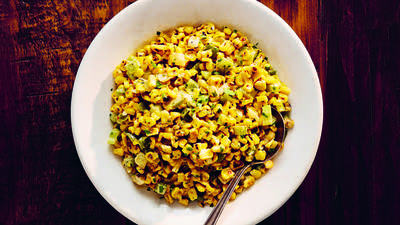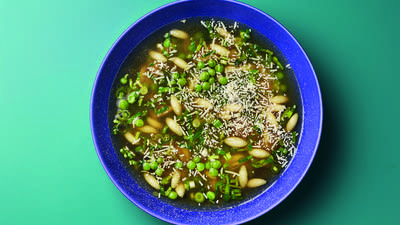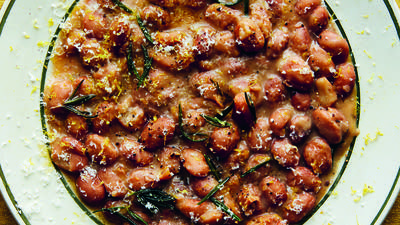
"We don't talk about food in mental health or in psychiatry very much, even though we talk about a lot of compounds in food," says Dr. Drew Ramsey, author of Eat Complete. He explains what foods he recommends to patients to help them feel their best. Ramsey is assistant clinical professor of psychiatry at Columbia University College of Physicians and Surgeons.
'The fork … becomes a really nice intervention for a psychiatrist'
David Leite: Explain how you came to this position of food as medicine.
 Drew Ramsey
Photo: Ellen Silverman
Drew Ramsey
Photo: Ellen Silverman
Drew Ramsey: This is what happens when you turn an Indiana farm boy into a New York City psychiatrist. I'd always been interested in food in my personal life. For years I was a vegetarian, I think like a lot of people, really focusing on eating to be healthy. Then I became a physician. I came out to Columbia and became a psychiatrist.
We don't talk about food in mental health or in psychiatry very much, even though we talk about a lot of compounds in food. I think the moment for me was talking with a patient and needing another tool in my toolbox, and realizing food presents an incredible opportunity. The fork then becomes a really nice intervention for a psychiatrist, especially if I want to prescribe something really delicious and gorgeous that connects you to you, your friends and family with great food.
But you have to have a healthy gut to have a healthy brain. Besides the nutrients, there is this new, cool piece of science about the microbiome, all of the bugs living in the gut, which we don't usually talk about. This new book is very unique in the sense that it's weird to talk about bacteria in a cookbook in a positive way.
The microbiome is all your inhabitants, your silent passengers, the trillions of bacteria in the gut. They dictate a lot about our immunological system, our mental health and brain health. There's a lot to do with the gut and how we feel, all those brain signals we're looking for. Good moods, sharp thinking, lots of focus, lots of energy -- that's all brain phenomena.
'Some people are big pharma -- I'm little farmer'
DL: I've read that you actually prescribe food to help people with depression and anxiety. Being someone who suffers from bipolar disorder, I was fascinated by that. I thought, "Maybe there's something else I can do on my own that's non-medical and not medication to help myself."
 Eat Complete
Eat Complete
DR: I love hearing that because that's the exact intention of the book. What else can people do in their own lives -- whether they have a diagnosis or not -- to help feel their best?
I think you already know about that. I suspect you, as a cook, a chef, and someone who loves food -- there are those moments that you use food and you nourish yourself. It's a meal that's good for you, and you know it's healthy.
Because the way that brain food works, and the way I think it helps people with a diagnosis or without [who are] just trying to have optimal brain health, is that there are foods that are more nutrient dense. They have more of these special nutrients that our brain needs, things like omega-3 fats, vitamin B12 or iron. When we're deficient in these nutrients or when our diet is low in them, our brains just don't function as well.
Take vitamin B12, which is a very good example. That causes people to get depression. It causes their brains to shrink faster as they age. What are the top foods with vitamin B12? Shouldn't we be prescribing those for our patients instead of just saying, "You should take your multivitamin or a B12 supplement"?
DL: Why not supplements?
DR: I think that the road to health is paved with food, not with supplements. If you have a deficiency, if you have a specific condition, sure, that makes sense. In the winter I give my patients vitamin D supplements because they're deficient. But I also make sure that they know that mushrooms, oysters and other fatty seafood are the top dietary sources of vitamin D. Because at every meal, I want people to be getting those nutrients. That's how you build a better brain.
Supplements frighten me a little bit. They're totally unregulated. You want a scare, go to the FDA [Food and Drug Administration] website that looks at recalls of natural supplements. It's terrifying.
For my patients and for my prescriptions, I like to stick with the stuff from the farm. Some people are big pharma -- I'm little farmer. I think that's really where the best medicine comes from for the foundation of your health.
'Seafood, greens, nuts and beans'
DL: What are the most important foods to be able to get into your diet for maximum brain health?
 Ramsey's recipe: Mussels Three Ways
Ramsey's recipe: Mussels Three Ways
DR: I have a little rhyme that I've been using for a while: seafood, greens, nuts and beans. And don't forget a little dark chocolate.
The seafood is something that we see people missing. This is your source of omega-3 fats. If we think about what most eaters need to do, the average American eater out there needs to decrease their red meat and processed meat intake. One great way to do that is replace it with some seafood, wild salmon or wild shrimp, or add in a little ceviche here and there. There are great ways to do seafood. Mussels are one of my favorites because there's so much nutrient density, not a lot of calories. Just six oysters have 500 percent of your daily need for zinc.
Leafy greens are a great base. You swap out a lot of the empty carbohydrates you get from things like pastas or breads, and you can use some leafy greens. Again, just lots of nutrient density.
Nuts, first of all, have 25 percent fewer calories. The USDA [U.S. Department of Agriculture] just released something last year saying, "Whoops, we made a mistake." They're actually not as many calories in nuts. Nuts are a great snack. They are a great way to keep yourself full. They're a wonderful way to add protein and healthy monounsaturated fats to your diet. They're full of all these phytonutrients, like all plants are.
So seafood, greens, nuts and beans. Again, just more plant-based proteins and more great food for the microbiome.
There's such a focus on and such a hype around probiotic supplements. Really the best data about how to take care of your gut and your microbiome tells us to eat more plants and probiotic fermented foods -- that's kefir, kimchee, making your own sauerkraut. That takes cabbage, salt and a Mason jar. It's easy to make fermented foods. We want more of those in the diet because those natural fermented foods are better for your health than a probiotic.
People don't know this: The top antioxidant-containing food is not the blueberry. It's the small red bean. Traditional Mediterranean diets, Portuguese diets, you just see beans in there, even in the stews with the meats like feijoada. It's a great dish where again you have the flavorfulness of the meat, but it's not all meat.
That's really one of the goals is to help people move toward a plant-based diet. Because mostly what we want you eating is plants, but to have what I call sensible seafood and mindful meat. When you're going to be eating meat, be mindful about it for your own health and for the planet's health. You certainly can do that.
DL: When you say mindful, what kind of meats should we have? What kind of eggs should we have?
 Ramsey's recipe: Whole Roasted Chicken with Anchovies and Olives
Ramsey's recipe: Whole Roasted Chicken with Anchovies and Olives
DR: I really believe in the small farm. I'm from a small farm. I believe that you buy your eggs from somebody close. You can do that now in America. That used to sound crazy. Now there are, by last count, 8,144 farmers markets in America. You can shake your farmer's hand.
I like things that are grass-fed or pasture-raised. When the animals are out like that doing what they do -- when cows eat grass, the meat product is healthier, the dairy products are healthier, the yogurt is healthier. People say it's a trend, but this is traditionally how we've always done it. That's where you're going to get the healthiest products, in my opinion, for meat and for dairy.
Before you go...
Each week, The Splendid Table brings you stories that expand your world view, inspire you to try something new, and show how food connects us all. We rely on your generous support. For as little as $5 a month, you can have a lasting impact on The Splendid Table. And, when you donate, you’ll join a community of like-minded individuals who love good food, good conversation, and kitchen companionship. Show your love for The Splendid Table with a gift today.
Thank you for your support.
Donate today for as little as $5.00 a month. Your gift only takes a few minutes and has a lasting impact on The Splendid Table and you'll be welcomed into The Splendid Table Co-op.




